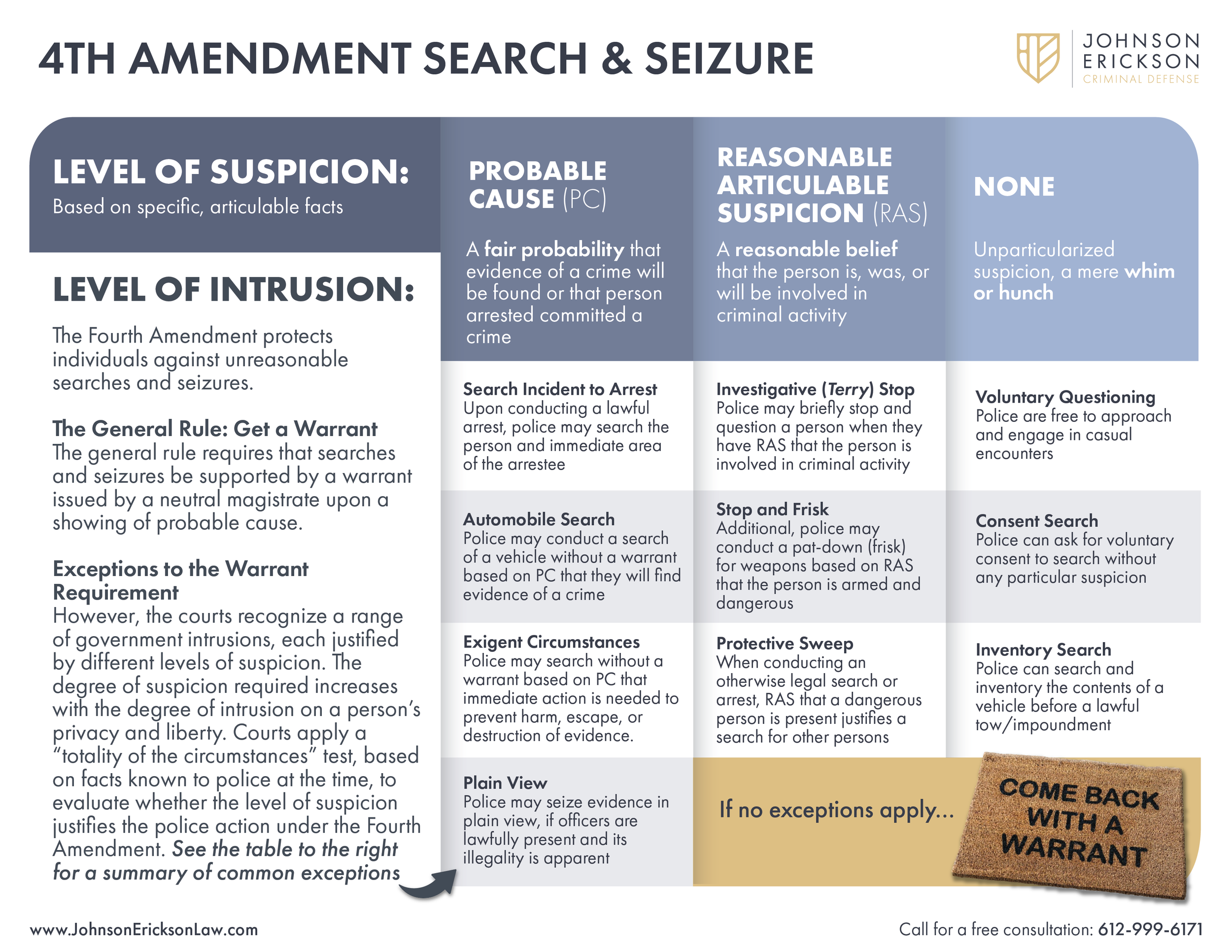Search and Seizure Under the 4th Amendment
What exactly are your 4th Amendment protections? When can the police search you without a warrant? What does it mean to be “searched” or “seized”?
The General Rule: Get a Warrant
The Fourth Amendment to the U.S. Constitution protects individuals against unreasonable searches and seizures. As a general rule, it requires that searches and arrests be supported by a warrant issued by a neutral magistrate upon a showing of probable cause—meaning there must be a fair probability that evidence of a crime will be found in the place to be searched or that the person to be arrested has committed a crime.
Definitions
In order to understand your 4th Amendment rights, you first have to understand some constitutional terminology:
A search occurs when government conduct infringes upon a person’s reasonable expectation of privacy, or when the government physically intrudes on a constitutionally protected area (such as a home, person, or effects) to obtain information.
A seizure occurs when government action meaningfully interferes with a person’s possessory interest in property or restrains a person’s freedom of movement through force or a show of authority.
A person has a reasonable expectation of privacy when:
They exhibit an actual (subjective) expectation of privacy, and
Society is prepared to recognize that expectation as objectively reasonable.
Exceptions to the Warrant Requirement
The courts recognize a range of government intrusions that are allowed without a warrant, each justified by different levels of suspicion. The degree of suspicion required increases with the degree of intrusion on a person’s privacy and liberty. Courts apply a “totality of the circumstances” test to evaluate whether the level of suspicion justifies the police action under the Fourth Amendment.
4th Amendment Search and Seizure
The following is a summary of the common exceptions to the warrant requirement, and the level of suspicion required to justify these exceptions:
No Suspicion (Mere Whim or Hunch)
Definition:
This is the lowest level—no objective facts are required. Police may act on a mere whim, curiosity, or routine, so long as the action does not amount to a seizure or search, or fits within a narrow exception.
Permitted Intrusions Without Any Suspicion:
Consensual Encounters:
Police may approach individuals, ask questions, and request consent to search without any suspicion.
As long as the person feels free to leave, no seizure has occurred.
Consent Searches:
If consent is freely and voluntarily given, officers may conduct a full search without suspicion or a warrant.
Inventory Searches:
Lawful when property (usually a vehicle) is impounded.
Must follow standardized procedures and be non-investigatory.
Jail/Prison Intake Searches:
Strip or body searches upon admission to jail—even for minor offenses—require no suspicion.
Airport Security Screenings:
Routine screenings for weapons and explosives require no individualized suspicion.
Reasonable Articulable Suspicion
Definition:
A specific, objective basis for suspecting that a person is, was, or will be involved in criminal activity. It must be more than a hunch and supported by identifiable facts.
Permitted Intrusions Based on Reasonable Suspicion:
Terry Stop (Investigative Stop/Detention):
Brief detention to investigate suspected criminal activity.
Stop and Frisk (Terry Frisk):
A limited pat-down for weapons if the officer has reasonable suspicion that the person is armed and dangerous.
Vehicle Stops:
Traffic stops are permitted with reasonable suspicion of a traffic violation or other criminal activity.
Protective Sweep (Limited):
During in-home arrests, police may check areas immediately adjoining the arrest location if they suspect a hidden threat.
School Searches (by Staff):
School officials may search students with reasonable suspicion of a rule or law violation.
Probable Cause
Definition:
A reasonable belief, based on facts and circumstances, that a crime has been committed or that evidence of a crime will be found in a particular place. It is a higher standard than reasonable suspicion.
Permitted Intrusions Based on Probable Cause (Without a Warrant):
Search Incident to Lawful Arrest:
Upon arrest supported by probable cause, police may search the arrestee and area within their immediate control.
Automobile Exception:
Police may search a vehicle without a warrant if they have probable cause to believe it contains evidence or contraband.
Exigent Circumstances:
Probable cause plus urgent need (e.g., risk to life, destruction of evidence, hot pursuit) justifies warrantless entry or search.
Plain View Doctrine:
Officers may seize items in plain view if they are lawfully present and it’s immediately apparent the item is contraband or evidence.
Probable Cause Arrest (Public Place):
Police may arrest without a warrant in a public place if they have probable cause.
In Minnesota, police can arrest any time based on probable cause that the arrestee committed a felony. If the probable cause is only for a misdemeanor or gross misdemeanor, police can only arrest if the offense was committed in the officer’s presence or falls under a list of specified offenses (e.g. harassment, theft, and certain domestic related crimes).
What happens if the police violate my rights?
Courts have the Exclusionary Rule, which prevents the government from using evidence obtained through violations of the Fourth Amendment (and certain other constitutional rights) in a criminal trial. Its purpose is to deter unlawful police conduct by removing the incentive to conduct illegal searches or seizures.
If you believe your rights were violated during a stop, search, arrest, or criminal investigation, don’t face it alone. Call Johnson Erickson Law today to speak with an experienced defense attorney who will fight to protect your constitutional rights.


